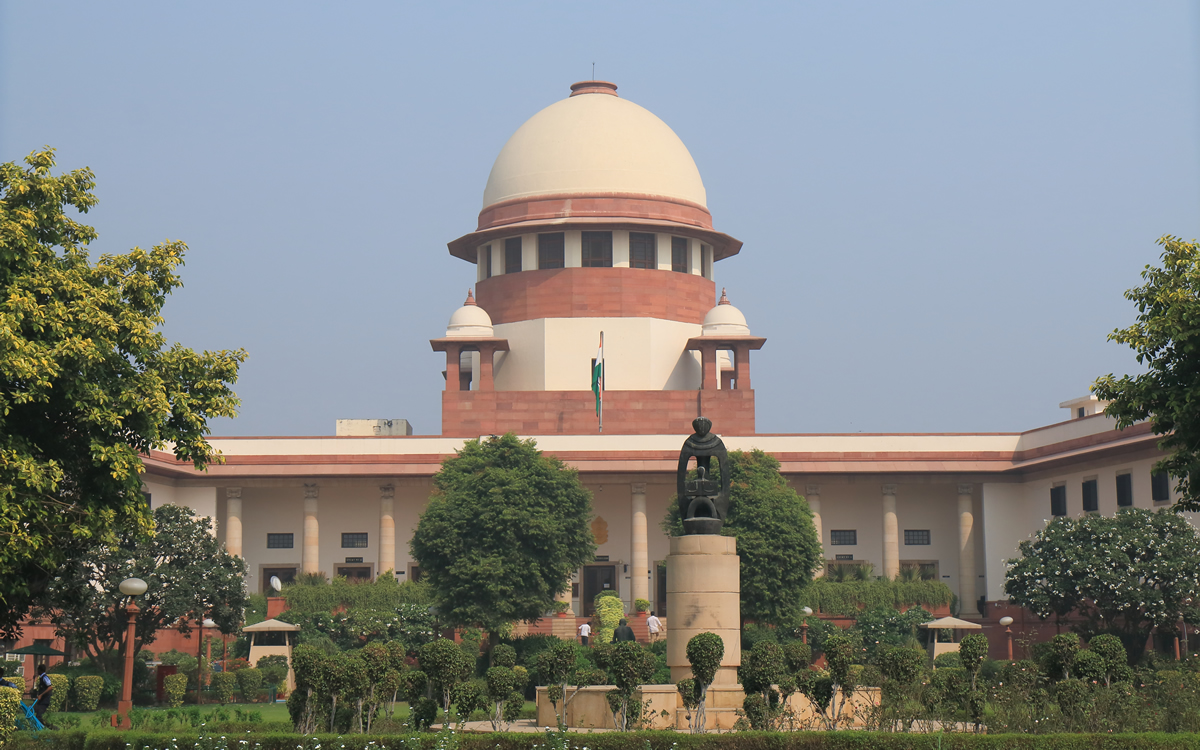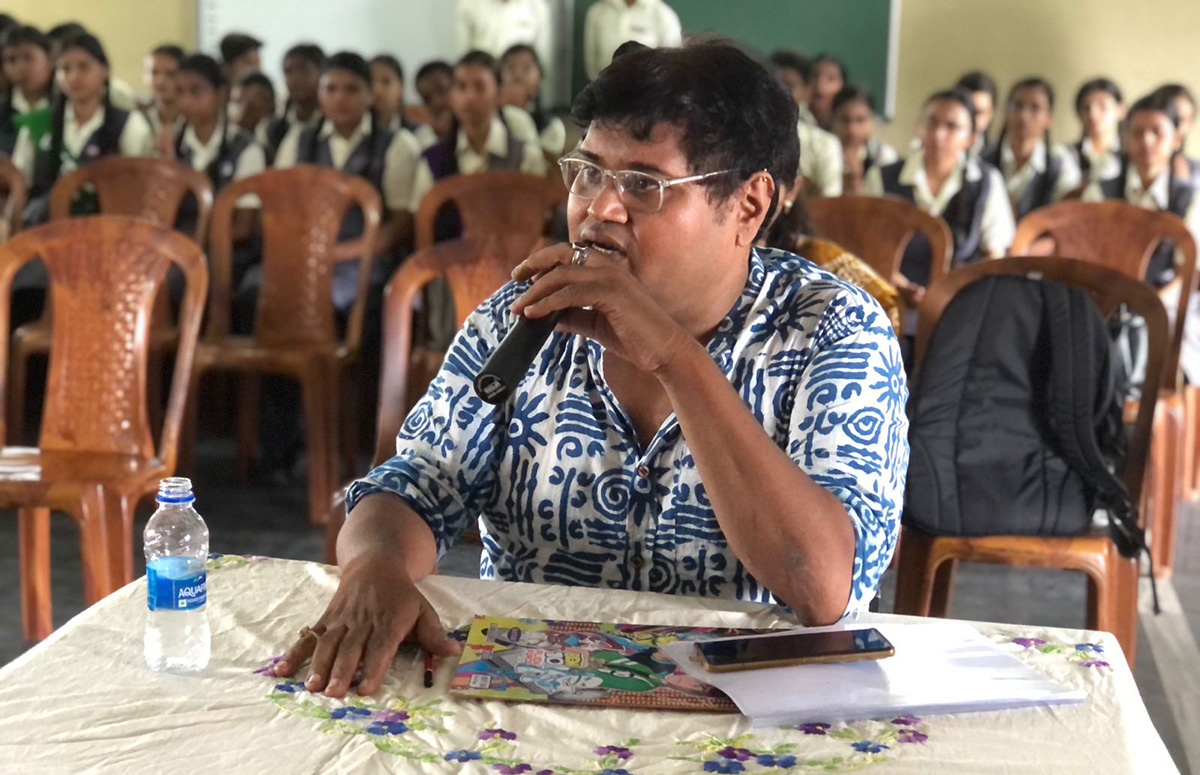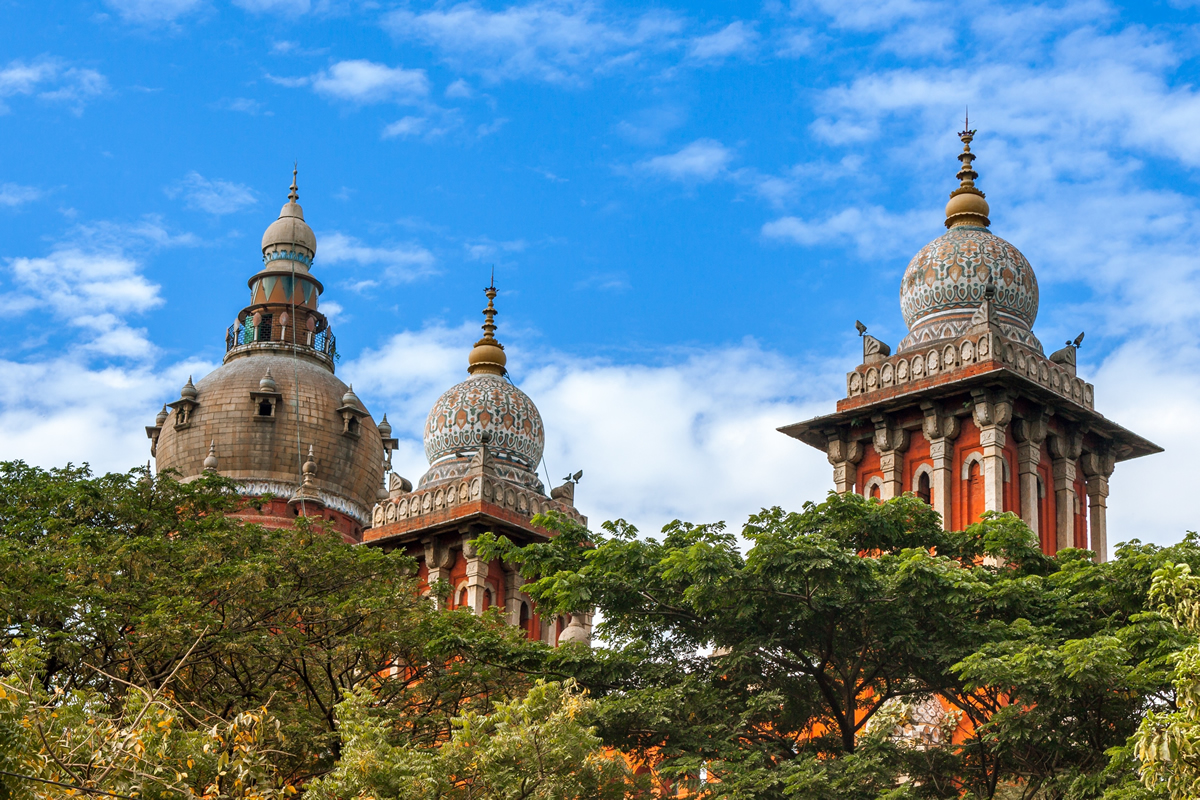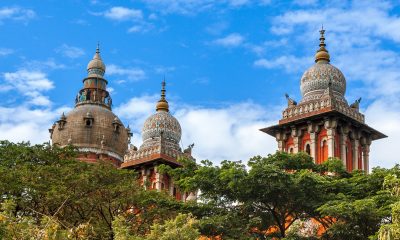India
Indian Supreme Court continues to review marriage equality ruling
Fight for full LGBTQ rights in country continues

On July 10, as India’s Supreme Court was engrossed in a pivotal review petition concerning marriage equality, an unexpected twist unfolded.
Justice Sanjiv Khanna, the court’s most senior judge, made the surprising decision to recuse himself from considering the pleas. This unforeseen development added a dramatic layer to a historic and closely watched judicial review.
The pleas seek a review of the Supreme Court’s ruling from last year that declined to legally recognize same-sex marriage. Reports indicate Khanna cited personal reasons for his recusal, adding a layer of intrigue to the already high-stakes proceeding.
In the wake of Khanna’s unexpected recusal, the Supreme Court is set to undergo a significant shift.
According to the court’s procedural rules, Chief Justice Dhananjaya Yeshwant Chandrachud will reconstitute a new 5-judge constitution bench. This pivotal move marks a crucial step in the ongoing legal saga, ensuring the review of the marriage equality case continues with a fresh panel at the helm.
The Supreme Court, led by Chandrachud, on July 9 made a crucial decision regarding the review petition. It declined to grant an open court hearing, stating the constitutional bench review would be conducted in chambers rather than in open court.
The Supreme Court’s clarification came after petitioners, challenging last October’s marriage equality ruling, fervently urged the top court for an open court hearing. Their plea sought transparency and public scrutiny, hoping to bring the issue back into the spotlight.
The court in its October 2023 ruling said the power to extend marriage rights to same-sex couples lies with parliament, not the judiciary, underscoring the need for legislative action to address this crucial issue.
Although the top court refused to grant marriage rights to the queer community in India, it did recognize their right to live free from discrimination. The court affirmed queer people should have the same access to goods and services as their heterosexual counterparts, ensuring protection against bias and unequal treatment in everyday life. This decision, while falling short of full marriage rights, marked a crucial step forward in the fight for equality and dignity for the LGBTQ community in India.
The Supreme Court last year in a landmark ruling said transgender people in heterosexual relationships have the right to marry under the existing legal provisions.
Neeraj Kishan Kaul brought the review petition before the Supreme Court, requesting an open hearing on the case seeking legal recognition of same-sex marriages.
The petition specifically addressed the inclusion of same-sex marriages under the Special Marriage Act (SMA) of 1954, the Foreign Marriage Act of 1969, and the Citizenship Act of 1955, as well as under common law and other existing statutes. This plea highlighted the broad legal framework that could accommodate same-sex marriages, urging the court to reconsider its stance in a transparent and public forum.
The Supreme Court last October also declined to grant adoption rights to the LGBTQ community. The court upheld Regulation 5(3) of the Indian CARA Regulations, asserting that this provision could not be declared void.
According to CARA Regulations, specifically Regulation 5(3), “No child shall be given in adoption to a couple unless they have at least two years of a stable marital relationship, except in cases of relative or step-parent adoption.” This regulation underscores the stringent criteria set for adoption, emphasizing the importance of a stable and legally recognized marriage, thereby excluding LGBTQ couples from adopting children under the current legal framework.
The regulation outlines the eligibility criteria for prospective adoptive parents. According to Regulation 2(b) and (c), a single female can adopt a child of any gender, whereas a single male is not eligible to adopt a girl child.
Although the 2023 judgment did not favor the LGBTQ community regarding marriage equality, the Supreme Court made a significant acknowledgment. It recognized being a member of the LGBTQ community is a natural phenomenon and not an “urban or elite” phenomenon, as previously suggested by the government.
Marriage equality in Thailand gives Indian activists hope; challenges remain
Negha Shahin, who in 2022 became the first trans actress to win a Kerala State Film Awards, told the Washington Blade that LGBTQ Indians continue to face systemic discrimination and legal challenges, particularly in the fight for marriage equality.
“We live in 2024 when humanity has made remarkable advancements in science and technology. We understand the complex theories behind black holes and have successfully sent rockets into space. Yet, it is deeply disappointing that we still fail to recognize and uphold the basic rights of the queer community,” said Shahin. “For years, activists and allies have been advocating for the recognition of same-sex marriages, striving for a society where love and commitment are acknowledged and respected regardless of gender or sexual orientation.”
She said the Supreme Court’s denial of marriage rights for same-sex couples is a major setback. Shahin added it underscores the gap between technological advancements and social progress.
“Denying this right to same-sex couples not only perpetuates inequality but also inflicts emotional and social harm on a significant segment of our population,” said Shahin. “We must increase the chances of achieving marriage equality by pushing for legislative changes.”
“Our lawmakers have a responsibility to create laws that reflect the values of equality and justice for all citizens,” she added. “Without ensuring the basic rights of gender and sexual minorities, we cannot truly claim that India is progressing. It is time for India to bridge this gap and ensure that the rights of the LGBTQIA community are fully recognized and protected. Only then can we truly say that we are growing as nation.”
Shahin discussed the recent passage of a marriage equality law in Thailand, which shares a maritime border with India. (Same-sex couples can also legally marry in Nepal, which borders India.)
She noted Thailand is a monarchy, whereas India is a democracy. Shahin told the Blade that one may have expected India to extend marriage rights to same-sex couples first, given the country’s democratic values and its emphasis on equality.
“Seeing a neighboring country like Thailand legalize same-sex marriage may create pressure on Indian lawmakers to address the issue more seriously,” she said. “It highlights the disparity in rights between countries and could push Indian politicians to consider similar legalization to avoid falling behind in terms of human rights.”
Souvik Saha, founder of People for Change, one of India’s premier LGBTQ rights groups, told the Blade that as an activist who works for LGBTQ rights in Jharkhand state, he sees recent developments regarding the Supreme Court’s review petition on same-sex marriage as a significant step forward.
“The recusal of a judge and the constitution of a new bench indicate a reevaluation of existing legal perspectives, potentially paving the way for progress towards marriage equality in India,” said Saha. “The global trend towards marriage equality, such as Thailand’s recent move, can certainly influence India’s judicial decisions and societal perceptions.”
“Thailand’s legalization of same-sex marriage in 2024 reflects a growing global acceptance and recognition of LGBT rights. This shift is noteworthy because it demonstrates that cultural attitudes and legal frameworks are evolving to embrace equality and human rights,” he added.

The Supreme Court in 2018 decriminalized consensual same-sex sexual relations in India.
Saha said there has been increasing momentum towards broader inclusion and equality since that landmark ruling. The U.N. Development Program’s 2020 report on LGBTQ rights in India he notes indicates this progress has been uneven.
The UNDP notes legal recognition and protection against discrimination are crucial steps towards achieving full equality. The involvement of civil society organizations and advocacy groups, such as those in Jharkhand, plays a crucial role in pushing for inclusive policies and legal reforms.
Ankush Kumar is a reporter who has covered many stories for Washington and Los Angeles Blades from Iran, India, and Singapore. He recently reported for the Daily Beast. He can be reached [email protected]. He is on Twitter at @mohitkopinion.
India
Anaya Bangar challenges ban on trans women in female cricket teams
Former Indian cricketer Sanjay Bangar’s daughter has received support

Anaya Bangar, the daughter of former Indian cricketer Sanjay Bangar, has partnered with the Manchester Metropolitan University Institute of Sport in the U.K. to assess her physiological profile following her gender-affirming surgery and undergoing hormone replacement therapy.
From January to March 2025, the 23-year-old underwent an eight-week research project that measured her glucose levels, oxygen uptake, muscle mass, strength, and endurance after extensive training.
The results, shared via Instagram, revealed her metrics align with those of cisgender female athletes, positioning her as eligible for women’s cricket under current scientific standards. Bangar’s findings challenge the International Cricket Council’s 2023 ban on transgender athletes in women’s cricket, prompting her to call for a science-based dialogue with the Board of Control for Cricket in India and the ICC to reform policies for trans inclusion.
“I am talking with scientific evidence in my hand,” Bangar said in an interview posted to her Instagram page. “So, I hope, this makes an impact and I will be hoping to BCCI and ICC talking with me and discussing this further.”
On Nov. 21, 2023, the ICC enacted a controversial policy barring trans women from international women’s cricket. Finalized after a board meeting in Ahmedabad, India, the regulation prohibits any trans player who has experienced male puberty from competing, irrespective of gender-affirming surgery or hormone therapy. Developed through a 9-month consultation led by the ICC’s Medical Advisory Committee, the rule aims to safeguard the “integrity, safety, and fairness” of women’s cricket but has drawn criticism for excluding athletes like Canada’s Danielle McGahey, the first trans woman to play internationally. The policy, which allows domestic boards to set their own rules, is slated for review by November 2025.
Bangar shared a document on social media verifying her participation in a physiological study at the Manchester Metropolitan University Institute of Sport, conducted from Jan. 20 to March 3, 2025, focused on cricket performance. The report confirmed that her vital metrics — including hemoglobin, blood glucose, peak power, and mean power — aligned with those of cisgender female athletes. Initially, her fasting blood glucose measured 6.1 mmol/L, slightly above the typical non-diabetic range of 4.0–5.9 mmol/L, but subsequent tests showed it normalized, reinforcing the study’s findings that her physical profile meets female athletic standards.
“I am submitting this to the BCCI and ICC, with full transparency and hope,” said Bangar. “My only intention is to start a conversation based on facts not fear. To build space, not divide it.”
In a letter to the BCCI and the ICC, Bangar emphasized her test results from the Manchester Metropolitan University study. She explained that the research aimed to assess how hormone therapy had influenced her strength, stamina, hemoglobin, glucose levels, and overall performance, benchmarked directly against cisgender female athletic standards.
Bangar’s letter to the BCCI and the ICC clarified the Manchester study was not intended as a political statement but as a catalyst for a science-driven dialogue on fairness and inclusion in cricket. She emphasized the importance of prioritizing empirical data over assumptions to shape equitable policies for trans athletes in the sport.
Bangar urged the BCCI, the world’s most influential cricket authority, to initiate a formal dialogue on trans women’s inclusion in women’s cricket, rooted in medical science, performance metrics, and ethical fairness. She called for the exploration of eligibility pathways based on sport-specific criteria, such as hemoglobin thresholds, testosterone suppression timelines, and standardized performance testing. Additionally, she advocated for collaboration with experts, athletes, and legal advisors to develop policies that balance inclusivity with competitive integrity.
“I am releasing my report and story publicly not for sympathy, but for truth. Because inclusion does not mean ignoring fairness, it means measuring it, transparently and responsibly,” said Bangar in a letter to the BCCI. “I would deeply appreciate the opportunity to meet with you or a representative of the BCCI or ICC to present my findings, discuss possible policy pathways, and work towards a future where every athlete is evaluated based on real data, not outdated perceptions.”
Before her transition, Bangar competed for Islam Gymkhana in Mumbai and Hinckley Cricket Club in the U.K., showcasing her talent in domestic cricket circuits. Her father, Sanjay Bangar, was a dependable all-rounder for the Indian national cricket team from 2001 to 2004, playing 12 test matches and 15 One Day Internationals. He later served as a batting coach for the Indian team from 2014 to 2019, contributing to its strategic development.
Cricket in India is a cultural phenomenon, commanding a fanbase of more than 1 billion, with more than 80 percent of global cricket viewership originating from the country.
The International Cricket Council, the sport’s governing body, oversees 12 full member nations and more than 90 associate members, with the U.S. recently gaining associate member status in 2019 and co-hosting the 2024 ICC Men’s T20 World Cup. The BCCI generated approximately $2.25 billion in revenue in the 2023–24 financial year, primarily from the Indian Premier League, bilateral series, and ICC revenue sharing. The ICC earns over $3 billion from media rights in India alone for the 2024–27 cycle, contributing nearly 90 percent of its global media rights revenue, with the BCCI receiving 38.5 percent of the ICC’s annual earnings, approximately $231 million per year.
Women’s cricket in India enjoys a growing fanbase, with over 300 million viewers for the Women’s Premier League in 2024, making it a significant driver of the sport’s global popularity. The International Cricket Council oversees women’s cricket in 12 full member nations and over 90 associate members, with the U.S. fielding a women’s team since gaining associate status in 2019 and competing in ICC events like the 2024 Women’s T20 World Cup qualifiers. The BCCI invests heavily in women’s cricket, allocating approximately $60 million annually to the WPL and domestic programs in 2024–25, while contributing to the ICC’s $20 million budget for women’s cricket development globally. India’s media market for women’s cricket, including WPL broadcasting rights, generated $120 million in 2024, accounting for over 50 percent of the ICC’s women’s cricket media revenue.
“As a woman, I feel when someone says that they are women, then they are, be trans or cis. A trans woman is definitely the same as a cis woman emotionally and in vitals, and specially, when someone is on hormone replacement therapy. Stopping Anaya Bangar from playing is discrimination and violation of her rights. It is really sad and painful that every trans woman need to fight and prove their identity everywhere,” said Indrani Chakraborty, an LGBTQ rights activist and a mother of a trans woman. “If ICC and BCCI is stopping her from playing for being transgender, then I will say this to be their lack of awareness and of course the social mindsets which deny acceptance.”
Chakraborty told the Blade that Bangar is an asset, no matter what. She said that the women’s cricket team will only benefit by participation, but the discriminating policies are the hindrance.
“Actually the transgender community face such discrimination in every sphere. In spite of being potent, they face rejection. This is highly inhuman. These attitudes is regressive and will never let to prosper. Are we really in 2025?,” said Chakraborty. “We, our mindset and the society are the issues. We, as a whole, need to get aware and have to come together for getting justice for Anaya. If today, we remain silent, the entire community will be oppressed. Proper knowledge of gender issues need to be understood.”
The BCCI and the International Cricket Council have not responded to the Blade’s repeated requests for comment.
India
Indian court rules a transgender woman is a woman
Activists across the country celebrated landmark decision

The Andhra Pradesh High Court on June 16 issued a landmark ruling that says Indian law cannot deny transgender women recognition as women solely because they cannot bear children.
Justice Venkata Jyothirmai Pratapa, who presided over the case, rejected arguments that tie womanhood exclusively to reproductive capacity, declaring such views “legally unsustainable” and contrary to the Indian constitution’s guarantees of dignity, equality, and identity. The decision, rooted in the Supreme Court’s 2014 National Legal Services Authority v. Union of India ruling that recognized individuals as a “third gender” with equal fundamental rights, marks a significant step toward gender justice in India.
“A trans woman, born male and later transitioning to female, is legally entitled to recognition as a woman,” Pratapa declared.
The court emphasized this recognition is enshrined in Articles 14, 15, and 21 of the constitution; which guarantee equality before the law, prohibit discrimination based on sex, and protect the right to life and personal liberty respectively. Pratapa further clarified that trans women are entitled to the same protections as cisgender women under Section 498A of the Indian penal code, which addresses cruelty by a husband or his relatives.
“Denying such protection by questioning their womanhood amounts to discrimination,” said the High Court in its ruling.
The ruling came in response to a petition filed by Viswanathan Krishnamurthy and his parents, who sought to dismiss a dowry harassment case brought by Pokala Sabhana, a trans woman. Shabana alleged that Krishnamurthy and his family subjected her to cruelty and demanded dowry, charges that prompted her to seek protection under Section 498A.
The court’s decision to uphold her legal standing as a woman ensures that trans women can access critical protections against domestic abuse, setting a precedent for future cases.
Section 498A’s applicability to trans women, as the court affirmed, extends critical protections against domestic cruelty to marginalized groups. Trans women can now seek legal recourse under this provision for physical, emotional, or economic abuse, including dowry-related harassment, by their husbands or in-laws. This recognition ensures access to police intervention, potential arrest of perpetrators, and penalties under the Indian penal code, aligning trans women’s marital protections with those afforded to cisgender women. By including trans women under Section 498A, the ruling strengthens their ability to combat domestic violence and assert their rights within familial structures.
Shabana and Krishnamurthy lived together in Ongole, a city in Andhra Pradesh, for a short time before Krishnamurthy relocated to Chennai and ceased communication, according to the court document the Washington Blade obtained.
Shabana filed a complaint at the Ongole Women’s Police Station, alleging her in-laws threatened her life and that Krishnamurthy abused her. Based on her accusations, the police registered a case against Krishnamurthy and his parents under Section 498A.
Krishnamurthy and his parents in 2022 petitioned the Andhra Pradesh High Court to dismiss the case, arguing that Shabana, as a trans woman, could not invoke Section 498A, a provision typically applied to cisgender women.
The petitioners’ counsel argued that trans women, due to their inability to conceive, do not meet the legal definition of a woman and thus cannot invoke Section 498A. They also contended Shabana’s cruelty and dowry harassment allegations were baseless and lacked evidentiary support.
The Andhra Pradesh High Court rejected the petitioners’ arguments, ruling that gender identity does not hinge on the ability to bear children and other biological factors. The court affirmed that trans women, like Shabana, have the right to file complaints under Section 498A and are entitled to all constitutional protections afforded to women under the constitution.
While affirming that trans women are legally recognized as women, the Andhra Pradesh High Court dismissed the case against Krishnamurthy and his family, citing insufficient evidence rather than gender-based arguments.
The court noted Shabana’s claims of dowry demands and cruelty lacked supporting material. It ruled that proceeding with the trial without prima facie evidence would constitute a misuse of the judicial process.
“I am relieved, the delighted and thank the Andhra Pradesh High Court and the judge for upholding our basic human right to be identified as what we want. What better reason could that be for celebrating this Pride Month,” said Kalki Subramaniam, a prominent trans activist and artist. “For transgender community, especially trans women this verdict means a lot.”
Subramaniam told the Blade that the verdict is a momentous achievement. She described it as a significant stride toward justice, dignity, and equality for trans people throughout India.
“By affirming their legal status as women, the court has shattered discriminatory barriers and reinforced the fundamental principle that identity is valid and deserving of full legal protection,” said Subramaniam. “This ruling marks a significant moment of progress, sending a clear message that our legal frameworks are evolving to be more inclusive and reflective of the diverse realities of our society. It is a victory of human rights and a beacon of hope for a more equitable future.”
Meera Parida, a prominent trans activist in Odisha, told the Blade the ruling is a significant triumph.
“Only because a trans woman cannot bear a child, she is not a woman — that’s not good,” she said.
“This is a respectful judgement for all of us,” added Parida. “This is restoring equality and somewhere because of this verdict the stigmatization wall will fall and people will respect us. I respect this verdict.”
“This verdict is very progressive and a crucial step forward to the transgender community and gender equality,” Rani Patel, president and founder of Aarohan, an organization that works to address educational disparities among underprivileged communities and advocates for LGBTQ rights, told the Blade. “People said that we should give them separate toilets and classrooms, but that totally excludes them from the community. Many women also cannot give birth to a child, so that is totally different.”
“If someone is carrying themselves as female, they should be honored with their status,” added Patel. “Since the purpose of the verdict is to recognize trans women as women, they will get all the status and rights as cisgender women in dowry and harassment cases.”
India
Madras High Court says families are possible outside marriage
May 22 ruling could set important legal precedent in India

In a significant moment for India’s LGBTQ community ahead of Pride month, the Madras High Court on May 22 affirmed people can form families outside of marriage.
The decision, handed down by Justices G.R. Swaminathan and V. Lakshminarayanan, emphasized “marriage is not the sole mode to found a family,” recognizing the concept of “chosen families” as a well-established principle in LGBTQ jurisprudence.
A two judge Madras High Court panel ordered the release of a 25-year-old lesbian woman who had been forcibly separated from her partner and subjected to harassment by her birth family.
The Madras High Court sharply criticized the local police for their mishandling of the case, condemning their decision to force the woman back to her parents against her will. The two judges denounced the police’s “rank inaction” and insensitivity, emphasizing that government officials, particularly law enforcement, are obligated to respond swiftly and appropriately to complaints from LGBTQ people, ensuring their rights and safety are upheld.
The Madras High Court expressed unease with the term “queer,” noting its dictionary definitions as “strange” or “odd.” The judges questioned the appropriateness of the label in the context of describing LGBTQ identities, urging sensitivity in language to reflect the community’s dignity and rights.
“For a homosexual individual, their sexual orientation is natural and normal,” said the judges. “There is nothing strange about such inclinations. Why then should they be labeled queer?”
The Madras High Court judges observed that not all parents embrace their children’s identities, unfavorably comparing the detained woman’s mother to late-Justice Leila Seth, who publicly supported her son’s sexual orientation. The panel highlighted Seth’s acceptance as a model for familial understanding, underscoring the need for greater societal compassion toward LGBTQ people.
“The mother of the detenue is no Leila Seth,” said the court. “We understand her desire for her daughter to live a conventional heterosexual life, marry, and settle down. However, as an adult, the detenue is entitled to choose her own path.”
The Madras High Court emphasized the concept of “family” must be understood expansively, citing the Supreme Court marriage equality case and other precedents. These international guidelines affirm that all people, regardless of their sexual orientation or gender identity, are entitled to the full spectrum of human rights, reinforcing the court’s stance on recognizing chosen families within the LGBTQ community.
“While the Supriyo case may not have legalized marriage between same-sex couples, they can very well form a family,” the court said in its order. “The concept of ‘chosen family’ is now well settled and acknowledged in LGBTQIA+ jurisprudence. The petitioner and the detenue can very well constitute a family.”
The Madras High Court referenced Supriyo Chakraborty v. Union of India, which is the marriage equality case on which the Supreme Court ruled in 2023.
The Supreme Court in that ruling declined to extend marriage rights to same-sex couples, but recognized the rights of queer people to form families and urged the government to explore civil union protections, bolstering the court’s call for an expanded understanding of family.
The Madras High Court invoked landmark rulings, including NALSA v. Union of India (2014), which affirmed the right to self-identify as one’s gender, Navtej Singh Johar v. Union of India (2018), which decriminalized consensual same-sex sexual relations, and Shakti Vahini v. Union of India (2018), which upheld the right to marry by choice as a fundamental right. The two judges reaffirmed sexual orientation is an individual choice, falling within the ambit of personal liberty protected under Article 21 of the constitution.
Article 21 guarantees the right to life and personal liberty, stating no person shall be deprived of these rights except through lawful procedure. This fundamental right has been expansively interpreted by courts to encompass dignity, privacy, and autonomy, including protections for sexual orientation and other individual identities.
Souvik Saha, an LGBTQ activist and founder of People for Change, a leading Indian advocacy group, described the Madras High Court’s recognition of chosen families as both a relief and a validation of the community’s lived realities.
“As the founder of Jamshedpur Queer Circle and someone who has worked closely with LGBTQ+ individuals navigating rejection, violence, and social isolation, for decades, queer, and trans persons in India have built nurturing ecosystems outside their biological families — often due to rejection, abuse, or lack of acceptance,” said Saha. “This concept of ‘chosen family’ is not new to us; it’s a survival mechanism, a source of healing, and a space where we find dignity, belonging, and love. The fact that the judiciary now formally acknowledges these relationships marks a progressive and humane shift in how family is legally and socially understood.”
Saha shared the story of S, a transgender man from Jamshedpur whose biological family disowned him at 17.
Finding refuge with a queer couple who became his guardians, S received emotional support, celebrated milestones like birthdays, and was guided through education and gender-affirming healthcare. “Isn’t that family?” asked Saha.
Saha told the Washington Blade the Madras High Court’s ruling sparks hope for legal reforms; particularly in securing adoption, inheritance, and caregiving rights for queer people. He said the decision affirms that queer lives are not deviant but diverse, vibrant, and capable of forming loving, responsible families. Most crucially, Saha noted, it sends a powerful message to queer youth in Jamshedpur and other smaller cities that their lives and relationships are valid and valued.
“This ruling is a step forward, but we must be honest. Legal rulings alone won’t change police behavior unless they are followed by systemic structural reforms,” said Saha. “Policing in India is still deeply patriarchal, casteist, and heteronormative. Many officers still view LGBTQ identities as criminal or immoral, even after Section 377 was struck down in 2018.”
Saha said mandatory sensitization programs in every police academy are needed to transform attitudes. He said the inclusion of queer rights in law enforcement curricula — beyond token workshops — are also important. Saha added the recruitment of LGBTQ liaison officers and the formation of compliant mechanisms at the district level is needed.
“This ruling is a strong message from the judiciary, but unless the Ministry of Home Affairs and state police departments institutionalize this into practice, change will remain slow and uneven,” said Saha.
-

 U.S. Supreme Court1 day ago
U.S. Supreme Court1 day agoSupreme Court to consider bans on trans athletes in school sports
-

 Out & About2 days ago
Out & About2 days agoCelebrate the Fourth of July the gay way!
-

 Maryland5 days ago
Maryland5 days agoSilver Spring holds annual Pride In The Plaza
-

 Opinions5 days ago
Opinions5 days agoSupreme Court decision on opt outs for LGBTQ books in classrooms will likely accelerate censorship












